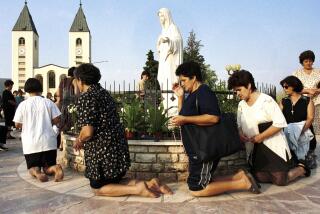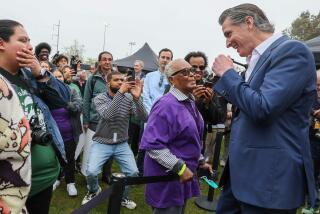Butting Heads With the Pope
From the offices of His Holiness, John Paul II, comes the latest message for divorced Catholics: no sex in any new relationship, even a new marriage.
The statement came from the Vatican’s Pontifical Council for the Family last week and, around the world, hearts sank.
In Los Angeles, a divorced Catholic woman engaged to remarry fretted during a physical therapy session. Her biofeedback machine went haywire.
In Arlington, Va., a Catholic man divorced more than 20 years gathered signatures on a letter to the Catholic Conference of Bishops in defense of remarriage.
And on the Internet, as usual, they let it all hang loose. From Dallas--”Another wacky example about Catholic rules of sex and marriage”--to Edinburgh, Scotland--”One must remember this is religion, so sense is the first thing out the window”--early responses amounted to a long, unguarded giggle.
But for most of this country’s 60 million Catholics, Vatican pronouncements are no laughing matter.
In recent years, increasingly vocal groups of Catholics have taken issue with one Vatican statement after another. Married priests, female priests, homosexual unions and civil divorce as the recognized termination of a marriage are hot-button topics on a long list of disputes. Clergy who openly defend changes in these areas have been silenced or even cut off from church membership.
“In one sense it’s nothing new,” says Father Thomas Rausch, chairman of the theology department at Loyola Marymount University in Los Angeles. “The statement upholds the position of the Vatican on the sacredness of marriage. If anything is surprising, it is that it so simply, baldly restates the position, without sensitivity to remarried Catholics who do not have an annulment.”
It’s another rift between the real world and the ideal world, a gap that puts Catholics trying to live within the rules of their church at odds with religious leaders who want to uphold the highest moral standards.
This week in Chicago, priests and members of the laity will take steps toward closing that gap as they gather for the first meeting of Catholic Common Ground Initiative, a project proposed by Chicago’s Cardinal Joseph Bernardin before his death in November.
Concerned by issues polarizing the church, Bernardin called for a series of dialogues. The first takes place this weekend in Chicago. Los Angeles Cardinal Roger Mahony, a member of the organizing committee, will preside over the closing session.
*
Divorce is not the most heated issue dividing the church, but it may well be the most sensitive.
Catholic teaching holds that marriage is a sacrament blessed by God--a holy covenant, not merely a legal contract. As such it cannot be dissolved. A Catholic marriage can be officially ended only by annulment, a process involving soul-baring questionnaires, probing personal interviews with church officials, expenses of $400 to $700 on average and months or even years. The entire process takes place at the hands of the church and is separate from legal divorce proceedings.
“We don’t recognize the state authority to dissolve a marriage,” says Father Gregory Coiro, spokesman for the Catholic Archdiocese of Los Angeles. “Objectively speaking, if a person marries someone else and has sexual intercourse, they commit adultery.”
While many parishes now offer counseling programs for separated and divorced members of the congregation, divorced Catholics are not supposed to receive the consecrated bread and wine of Communion, central to the Mass. According to official church teachings, divorced Catholics who remarry without an annulment are living in a state of sin.
In the privacy of the confessional, where Catholics talk over their most personal concerns with a priest, many now receive advice contrary to official church teachings.
“After my separation,” recalls the Los Angeles divorcee, who spoke on condition of anonymity, “I did not receive Communion for a long time. Finally I talked to a priest. He said, ‘You have punished yourself long enough. Receive Communion every Sunday, God has forgiven you.’ ”
She does not plan to go through the annulment process even though she is engaged to remarry. She repeats the language used by many priests, off the record, to explain the current state of affairs:
“The pope is telling us the official teachings of the church,” she says. “But every Catholic has to go through a process of discernment with the help of a priest, about their own situation.”
*
Charlie Davis, a retired naval officer in Arlington, Va., refused to go through the annulment process before he remarried more than 20 years ago. That is when he discovered that priests hold different views on how to react to Vatican pronouncements.
“My priest friends said, ‘Do what your conscience dictates,’ ” Davis says. “Then another priest told me it was not valid.” Davis went with the first opinion. “A Catholic priest performed the wedding ceremony for me and my second wife.”
A member of Catholics Speak Out, one of several dozen special interest groups within the church, Davis helped draft the letter to the bishops that some 20 groups signed. Among them are the National Assn. for a Married Priesthood, the Women’s Ordination Conference and the National Coalition of American Nuns.
“Catholic policy on marriage can cause consternation, concern, even despair for laypeople as well as priests who have to try making sense of it,” says Scott Appleby, director of the Cushwa Center for the Study of American Catholicism at Notre Dame University in South Bend, Ind.
“The latest statement from the Vatican raises as many questions as it answers,” he says. “I hope the Common Ground Initiative meeting will help us address those questions in a responsible way.”
An American culture watcher, Appleby sees “a radically individualized American Catholic culture, accustomed to making choices from a variety of sources.”
That presents a real challenge to church leaders. Appleby puts it in question form: “How do we talk about the teachings of the church and understand them so that both liberal and conservative Catholics can see the rigor of the teaching, perhaps not be easy with it, but at least recognize the doctrinal issue?”
Until a way is found, the situation will remain frustrating for American Catholics.
“There is no discourse,” Appleby says. “It becomes authority versus dissent.”
Still, he sees the current climate as positive.
“The American Catholic church is unique in how contentious, openly opinionated and disputatious it is,” he says. “But also in how seriously it takes these things.”
(BEGIN TEXT OF INFOBOX / INFOGRAPHIC)
Log On for Catholic News
If you want to follow the action in Chicago, the Catholic Archdiocese Web site is https://www.archdiocese-chgo.org/common.html.
The Vatican has its own Web site. For a look at all the statements released daily from Vatican City in Rome, see https://www.vatican.va/vis/d2_en.htm.
To get in on some of the chatter about the official church teaching on divorce and remarriage, one particularly lively newsgroup is alt.recovery.catholicism.
More to Read
Sign up for Essential California
The most important California stories and recommendations in your inbox every morning.
You may occasionally receive promotional content from the Los Angeles Times.










